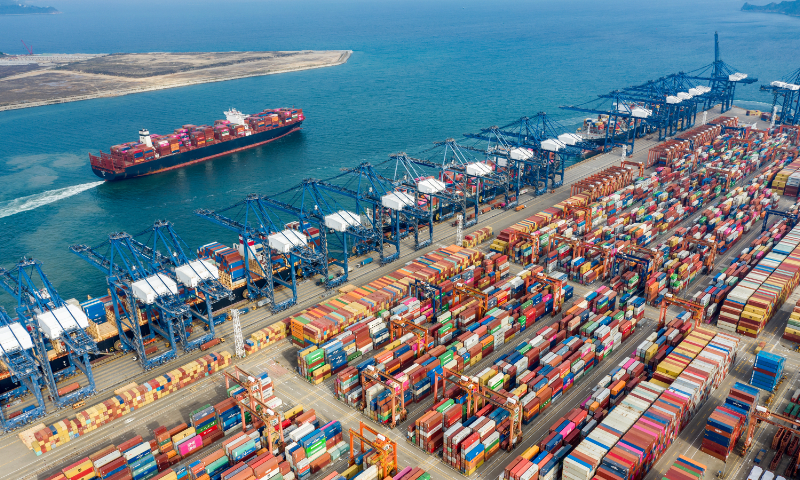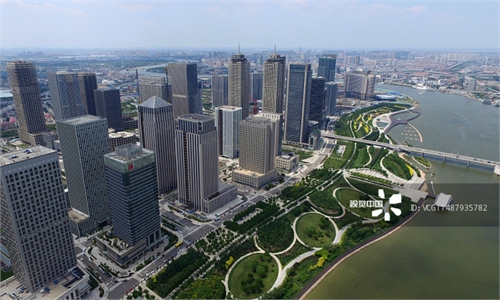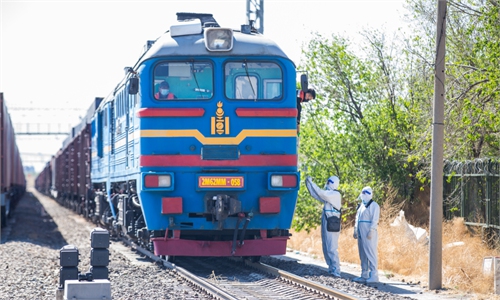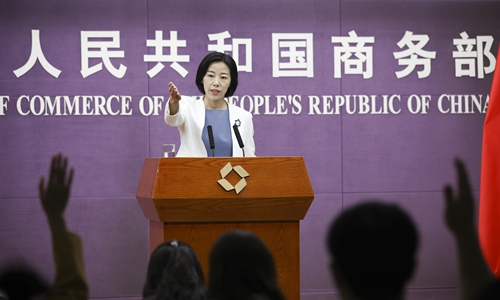Chinese trade promotion agency plans 35 overseas expos to boost exports amid downward pressure
Trade remains resilient due to cost, other advantages

Containers pile up at the busy Yantian Port in Shenzhen, South China's Guangdong Province. Photo: VCG
China's main foreign trade promotion agency said on Tuesday that it has recently approved 15 overseas economic and trade exhibition projects out of 35 such exhibitions planned to boost exports, which face downward pressure amid weak external demand and domestic COVID-19 flare-ups.
In announcing the major trade promotions, the China Council for the Promotion of International Trade (CCPIT) also said on Tuesday that it remains confident about the steady and qualitative development of China's foreign trade.
The CCPIT noted that it is actively promoting and approving overseas exhibition projects for key countries, industries and exhibitions, in order to help enterprises gain orders, expand their markets, and promote the stability and quality of foreign trade.
The organization has approved the first batch of 15 trial trade exhibition projects in eight countries including Germany, the US and the UAE, between November and February 2023, Sun Xiao, spokesperson for the CCPIT, said at a press conference on Tuesday.
The themes of the projects include textiles, auto parts, sports goods, electronics and consumer goods, with the exhibition scale ranging from 100 square meters to 10,000 square meters, Sun noted.
According to a notice released by the CCPIT in early November, a total of 35 overseas trial trade exhibitions have been planned in 14 countries, including Iran, Germany, US, Canada, Mexico, Italy, Australia, France, UAE, Russia, Japan, India, Bangladesh and Spain.
Efforts will also be made to optimize trade and investment services, and guide enterprises to make the best use of the Regional Comprehensive Economic Partnership (RCEP) and other free trade agreements, the CCPIT said.
In the first 10 months of 2022, China's trade councils issued 4.411 million certificates of origin, ATA Carnets and commercial certificates to promote foreign trade, an increase of 4.56 percent over the previous year, according to the CCPIT.
The organization said it will also guide enterprises to protect their legitimate rights in the face of US sanctions, the negative impact of the Ukraine crisis, and international economic and trade friction.
It also urged the US to review the Section 301 tariffs in a fair and just manner and take this chance to stop imposing additional tariffs on Chinese goods, which is hurting US manufacturers, workers and consumers.
Chinese foreign trade enterprises are facing multiple challenges of weakening external demand, rising costs and insufficient orders against the backdrop of the COVID-19 pandemic and global geopolitical tensions.
However, despite the complexity of the domestic and international environment, the trend of steady and qualitative development of China's foreign trade has not changed, the CCPIT noted.
China's foreign trade rose 9.5 percent year-on-year in the first 10 months in yuan terms, maintaining steady growth despite weakening demand abroad and geopolitical uncertainties, customs data showed.
In October alone, exports grew 7 percent year-on-year, though slower than the reading of 10.7 percent seen in September.
Potential recessions in Europe and the US dragged down external demand, while built-up inventory and recent COVID-19 flare-ups in multiple Chinese cities also affected exports, Bai Ming, deputy director of the International Market Research Institute at the Chinese Academy of International Trade and Economic Cooperation, told the Global Times on Tuesday.
However, China's export outlook remains resilient due to its advantages in costs and industrial chains, experts said.
Wu Chaoming, deputy head of the Chasing Research Institute, told the Global Times that due to high global inflation and production costs, domestic products will have a relative cost advantage.
Wu expects the integrity of China's industrial chain to play a prominent role in filling the global capacity gap, as a slow economic recovery and energy shortages weigh on European industrial production.
In the fourth quarter, efforts should be made to explore competitive export products such as new-energy vehicles and cultivate regional markets with RCEP members, Bai noted.
The CCPIT said it made new progress in economic and trade ties with ASEAN business sectors during the recent APEC CEO Summit in Bangkok, Thailand.
The delegation led by the CCPIT reached consensus with the Thai business community on effectively synergizing the Belt and Road Initiative and Thailand's development strategy, and strengthening cooperation in electric vehicles, clean energy, artificial intelligence and agriculture.
The CCPIT and the Singapore Chamber of Commerce & Industry also have agreed to carry out in-depth cooperation on the implementation of the RCEP, commercial legal services and on the New International Land-Sea Trade Corridor, the CCPIT said.



